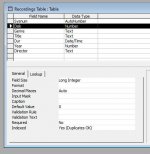Woodpecker
Member
- Local time
- Today, 03:26
- Joined
- Apr 30, 2023
- Messages
- 39
Good morning, I use Access 2000 to store details of recordings on DVD discs. There are well over 1000 discs on file and sometimes a disc may get damaged. These, I physically remove from the collection and also remove the record from the Recordings DB, which leaves gaps in the collection where those discs once lived. I would like to be able to run a query that identified positions in the file where the disc numbers are non sequential, ie. where a disc has been removed. Could anybody please suggest an expression criteria that would acheive this? Thanks.


